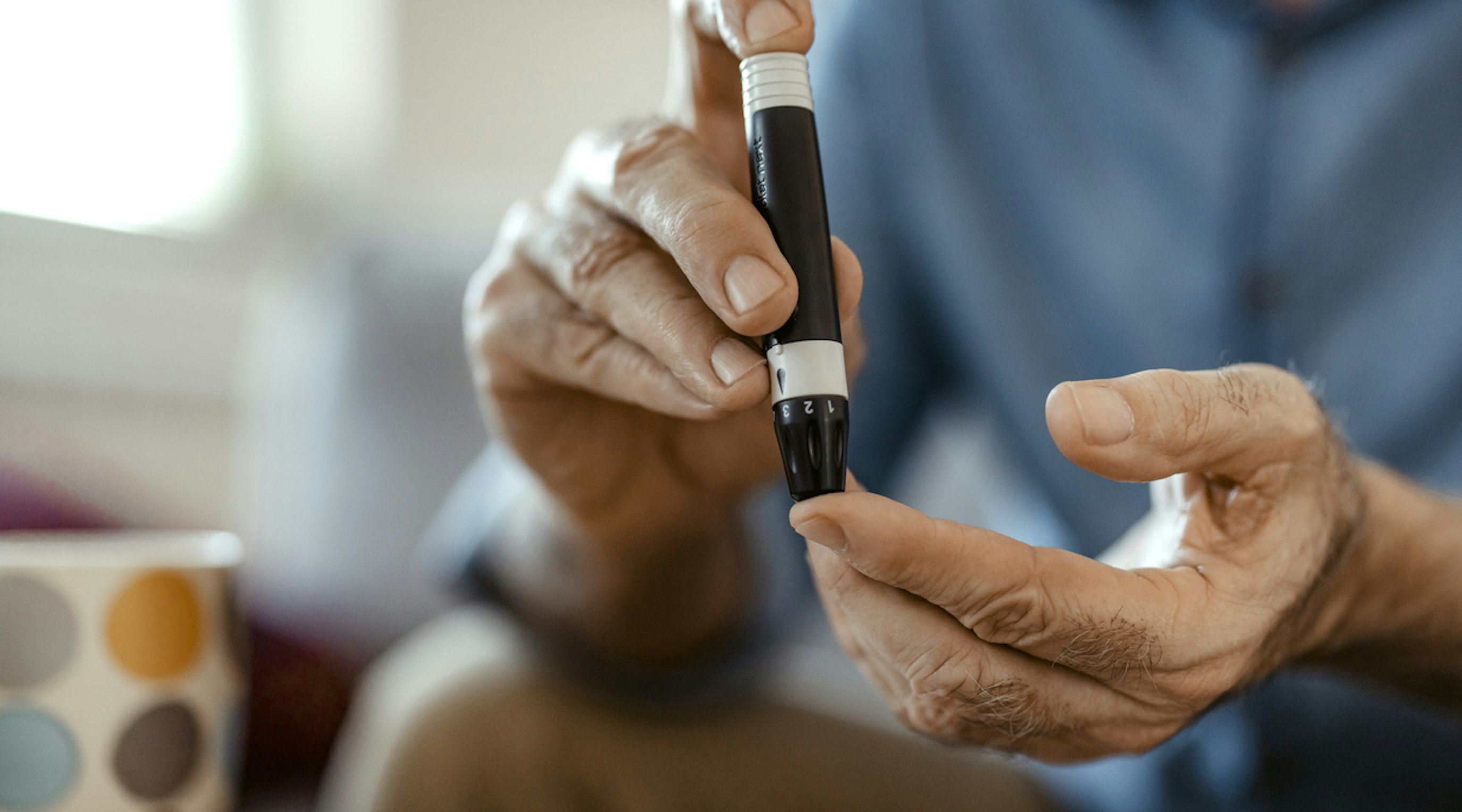How does medical cannabis interact with diabetes?
7 min read
Lucy MacKinnon
World Diabetes Day takes place every year on the 14th of November and this year, we’d like to contribute to the cause and raise awareness for medical cannabis - an alternative option for diabetes symptom management in the UK.
Contents
Although diabetes is relatively common, and around 4.4 million people are thought to have been diagnosed with some form of diabetes in the UK, that doesn’t mean living with it is always easy. In fact, research shows 36% of those with the condition experience diabetes distress, and 28% find it hard to remain positive about their condition.
As a chronic condition that causes blood sugar levels to rise, diabetes often causes people to feel exhausted or thirsty, unintentional weight and muscle loss, and experiences with mental health concerns and neuropathic pain, are unfortunately common.
If diabetes goes untreated, a number of other, serious health complications can occur. Heart disease, kidney disease, strokes, and nerve damage or diabetic neuropathy, are high on this list, and this regularly leads to other health problems including ulcers and skin infections, and sometimes even amputation.
So, it's imperative that when an individual is diagnosed with diabetes, a safe and effective treatment plan is established in a timely manner. And, while medical cannabis is not in any way a substitute or an alternate for insulin - it can be a powerful component in diabetes care plans thanks to its beneficial effects on symptoms like pain, fatigue, and mental health concerns.
For World Diabetes Day, we’ve decided to dive a little deeper and explore the potential of medical cannabis and diabetes symptom management.
But first, what is diabetes?
Our bodies produce a hormone called insulin, which is responsible for moving glucose from the bloodstream and into cells so it can be broken down and converted into energy. However, people with diabetes either can’t produce enough insulin, or their bodies don’t utilise insulin effectively.
And this proves problematic when food is digested and glucose enters the bloodstream. When there is insufficient insulin production or insulin that doesn’t work effectively, the body isn’t able to convert glucose into energy, and blood sugar levels can spike. In turn, this can affect a person’s mood, their ability to regulate pain, their level of fatigue, and so much more.
Generally speaking, diabetes is categorised by the way the body interacts with insulin. For example, people with type 1 diabetes have immune systems that attack the cells that produce insulin, meanwhile, people with type 2 diabetes don’t produce enough insulin, or, their bodies respond or react to insulin atypically. But there are other types of diabetes, including gestational diabetes, Wolfram syndrome, cystic-fibrosis related diabetes and neonatal diabetes.
How is diabetes treated?
The best way to treat diabetes is often with insulin and by implementing healthy lifestyle choices, but as with any treatment plan, this usually involves trial and error.
People with type 1 diabetes are advised to regularly monitor their blood sugar levels and typically have daily insulin injections to keep their blood sugar levels stable. Some patients now prefer to wear an insulin pump, which releases insulin directly into the bloodstream at carefully calculated moments, minimising the risk of a diabetic episode.
Meanwhile, people with type 2 diabetes are typically prescribed medications that help control their blood sugar levels like metformin tablets, sometimes as well as insulin, and most patients with type 2 are also encouraged to eat a healthy diet, exercise, and have regular blood tests.
While type 1 diabetes is a lifelong condition that’s unavoidable for some, around 90% of those with a diabetes diagnosis are believed to have type 2, and the risk of developing this type of diabetes can be significantly reduced by practising a healthy lifestyle.
But, what about the symptoms of diabetes, you may be wondering: ‘How are they conventionally treated?’
Well, much like other complex, chronic conditions in the UK the NHS tend to prescribe a similar range of generic painkillers, antidepressants or sleeping aids to diabetics who are struggling to manage these aspects of their condition. But, these aren’t always effective, and, they quite often cause unpleasant side effects.
The potential of medical cannabis in diabetes care
Medical cannabis has shown to operate in a multifaceted way because of the way its compounds utilise the endocannabinoid system. The endocannabinoid system, or ECS, is an extensive network that is responsible for regulating homeostasis, or balance within the body.
It does this by interfering with the signals and messages sent to and from receptors located within the ECS, which spans the brain and body. These messages or signals can relate to a wide range of biological responses or processes, but in the case of diabetes, those of particular note include pain perception and intensity, as well as recognition of fatigue and emotional changes.

Neuropathic pain: Diabetes cannabis treatment
Neuropathic pain is an unfortunately common symptom for people with diabetes. Dr Michal Modestowicz, Releaf’s Neurologist, explains:
“Neuropathic pain arises from nerve damage and is notoriously difficult to treat. [However,] medicinal cannabis has shown promise in studies by interacting with the endocannabinoid system to reduce pain perception and inflammation, providing a potential alternative for pain relief.”
While there are medications (often opioid-based painkillers) available to treat neuropathic pain, for some they cause unpleasant side effects, which leads them to look into alternatives like medical cannabis.
Secondary symptoms of diabetes: energy, mood, and medical cannabis
Issues with feeling tired, or fatigued, are also common for individuals with diabetes - but medical cannabis has shown to be a useful component in sleep management treatment plans too.
Because of the extensive variations in cannabis-based medicines formulations, some can be used to help energise, or increase focus and motivation, whereas other options induce fatigue, increasing tiredness and promoting relaxation, depending on the product's formula.
Of course due to the intricacies involved it's important these treatment plans are designed by qualified healthcare professionals and specialist doctors like those that work for Releaf. But generally speaking, our state of fatigue, or, our state of energy, significantly influences our mood and ability to regulate emotions effectively.
Patients usually find that once their sleep is regulated, this has a knock-on effect on their overall mood, quality of life, and often, levels of productivity. If conventional approaches have proven to be ineffective at meeting your needs in this area, you may be eligible for alternative options like medical cannabis, or prescribed cannabis oil through private healthcare clinics like Releaf.
Promising findings for future care
Interestingly, medical cannabis has also shown promising potential in helping to reduce arterial inflammation during early research. For those with diabetes, this, in turn, could result in improved blood flow and more stabilised blood sugar levels.
In theory, by keeping blood vessels open and improving circulation, the cannabinoids contained within medical cannabis may actually facilitate insulin while it directly targets glucose, making it easier for insulin to get its job done, as well as working in tandem to treat the associated symptoms previously mentioned. However, much more research is needed in this area before concrete conclusions can be drawn.
Is medical cannabis right for me?
If you’ve been wondering whether medical cannabis is right for you, head over to our blog, education, or FAQ section to find out more.
As always, when making decisions about your health it is important to speak with a qualified and knowledgeable healthcare professional to get the best advice, and our doctors are here to help you.
Share article
Did you like this article?
It is important to seek medical advice before starting any new treatments. The patient advisors at Releaf are available to provide expert advice and support. Alternatively, click here to book a consultation with one of our specialist doctors.
Elevate your wellness with medical cannabis
Get comprehensive care, convenience, and confidence with an all-in-one treatment plan.
Am I eligible?Authors
With five years of journalism and healthcare content creation under her belt, Lucy strives to improve medical cannabis awareness and access in the UK by producing high quality, credible content.
meet our specialist
Editorial Policy
All of our articles are written by medical cannabis experts, guided by strict sourcing guidelines, and reference peer-reviewed studies and credible academic research. Our expert clinical team and compliance specialists provide valuable insights to ensure accuracy when required. Learn more in our editorial policy.
Need more help?











